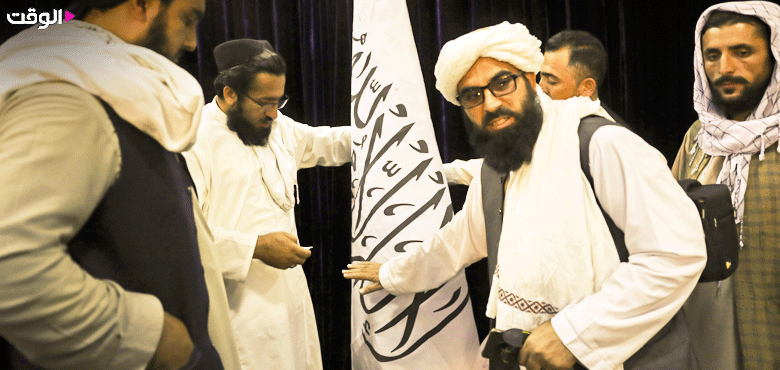Alwaght- Taliban finally announced its cabinet on Tuesday, ending the speculations about what it wants to do after seizing the capital Kabul on August 15. The cabinet contains a mix of prominent figures and some of those least known to the media and even Afghan society.
The list of cabinet members contains very important points about the Taliban's intended political structure, political goals, and the interaction with the opposition and rivals at home. Afghanistan is currently facing various economic and security crises, from terrorism to domestic armed opposition, migration and political instability, with the United Nations announcing on Tuesday that Afghanistan is facing a downfall in basic services, and running out of food and reserves.
Zabihullah Mujahed is the prime minister, Abdul Ghani Baradar and Andulsalam Hanafi deputy prime ministers, Mohammad Yaghoub Mujahed defense minister, and Imir Khan Mutaqi the foreign minister, announced the group's spokesman Zabihullah Mujahed.
Undoubtedly, the most important issue for Afghanistan at the moment is to maintain stability and prevent the country from falling into the swamp of insecurity and civil war.
So far, foreign countries have reacted cautiously and sometimes with concern about Taliban's cabinet.
Openly challenging the US
In a largely symbolic move and a gesture of muscle flexing, Taliban announced its government in the run up to the 20th anniversary of the 9/11 attacks.
At least three of the cabinet members are long-served inmates in the Americans prisons, released in 2014 in return for an American trooper.
Three out of the five former prisoners include Abdulhaq Waseq, as intelligence minister, Nourullah Nouri, as minister of borders and tribal affairs, and Kheyrullah Kheirkhah, as culture minister.
Handing the interior ministry to Sirajuddin Haqqani is another negative signal the Taliban passed to the US. Taliban gave the post, which is responsible for security and counterterrorism efforts, to a figure wanted by the US and whose capture is rewardable $10 million.
The 33-member cabinet is all-Pashtun, majorly constituted by Taliban veterans fought the US over the past 20 years.
The Interior Minister Sirajuddin is the son of Jalaluddin Haqqani, the founder of Haqqani Network, blacklisted as a terrorist organization by Washington. He is most wanted by the FBI for suicide attacks and links to Al-Qaeda, another terrorist group.
His FIB profile reads: "Sirajuddin Haqqani is wanted for questioning in connection with the January 2008 attack on a hotel in Kabul in which six people, including an American citizen, were killed."
The profile adds that he is believed to have had hands and coordinated attacks on the US and Western coalition forces in Afghanistan. He is also accused of planning to assassinate Hamid Karzai as a president of Afghanistan in 2008.
As a Taliban branch, Haqqani Network carried out a number of deadliest attacks in Afghanistan over the past two decades, including Kabul truck blast in 2017 that took lives of 150.
The group is also charged with attacks on the US embassy and a NATO base in Kabul in September 2011. The attack killed 8.
Some analysts say the accentuated role of the Haqqani Network, whose fighters were on the front lines when they captured Kabul last month, in the new cabinet has raised White House concerns about the consequences of a catastrophic withdrawal from Afghanistan, and the appointments show that the Taliban does not care much about recognition by the West and substantial international legitimacy.
The Department of State Spokesman Ned Price said that Washington was concerned about the track records and dependencies of some of the cabinet members appointed to key posts.
The White House Press Secretary Jen Psaki said the US is "not in a rush" to recognize Taliban government. She added that the Biden administration has not set a timetable for this and insists that the world would watch Taliban behavior.
Minute presence of minorities in Taliban cabinet
Another important issue regarding the new Afghan cabinet is the extremely small presence of religious and ethnic minorities in the ministries. There are only three members of the minority in the cabinet though they include key posts like Deputy Prime Minister Abdulsalam Hanafi, who is an Uzbek, and army chief Qari Fasihuddan, a Tajik.
Analysts say the absence of non-Pashtun tribes could spark ethnic clashes and provoke resistance from Uzbeks and Tajiks, who have a enjoy sympathy and public support in neighboring countries.
Last week, Iran condemned the Taliban for its military offensive on Panjshir Valley, the last stronghold of the opposition. Also, Russia stated that it does not recognize the Taliban government unless it is inclusive. The Taliban responded to the criticism of the cabinet by calling it temporary and lasting until the election.
Taliban's pro-negotiation circle in weaker position
Picking Mullah Hassan Akhund was a surprise, as political and media speculations leaned to Mullah Abdul Ghani Baradar, as the Taliban's chief negotiator and a prominent leader, for the post.
Mullah Abdul Ghani Baradar takes the title "Baradar", meaning brother, from Mullah Omar, the group's former leader. He is from Kandahar and one of the four main founders of the group, who founded the Taliban in 1994 with Mullah Mohammad Omar. Mullah Baradar was born in 1968 in Oruzgan province and grew up in Kandahar.
Mullah Abdul Ghani Baradar, involved in the war against the Soviets in the 1980s and Americans, appeared as second-in-command of the Taliban after death of Mullah Mohammad Omar in 2013.
For some time, he was imprisoned by the Pakistani Inter-Services Intelligence (ISI), and after freedom negotiated Taliban deal with Washington in Doha, Qatar, concluding with February 2020 agreement. Naming as prime minister a figure other than Mullah Baradar, and even Sher Mohammad Abbas Stanikzai as the main figure of the talks with the US, should be considered a successful move by hard-line layers in the Taliban to set the future policies of the government.



























